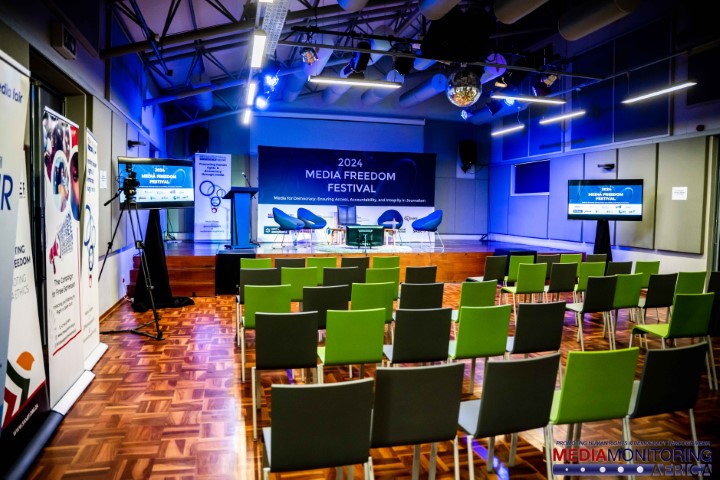Media freedom, censorship and sustainability discussed at Media Festival in Johanneburg
By Edward Tsumele, CITYLIFE/ARTS Editor
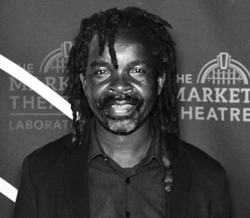
Okay, let us start from here. This article you are about to read is a result of an elaborate process that included planning, such as research about the topic, the players involved and the issues that are covered by this event, as well as the small matter of actually physically going there to listen attentively to the panels and the delegates as they engaged each other on the important issues of media freedom in South Africa, and certainly globally.
In other words to put together this article it took me at least two days of thinking, reading and writing. Of course ,not every hour of the two days. But still two days of elaborate planning and engaging with the issues and employing some resources into it, such as transport and of course the mind.
The reason of course I and certainly other journalists attending this event, having started on Tuesday, October 15, 2024, running till October 17, 2024 at Goethe-Institut in Johannesburg, is because we want to share with the public, meaning you dear reader the issues currently impacting the media landscape, and certainly the future of this important sector, regarded generally as the Fourth Estate due to its role as the watch dog over those that wield authority, such as government and the big corporate, to monitor and report on their excesses when it comes to the power they have over society, particularly over those that are vulnerable, such as the ruled, particularly the poor, women and children as well as of course the some men, especially those also vulnerable in society. The people who work for newspapers and other platforms as journalists are a special breed as they go beyond the call of duty to create the content they publish on those platforms for comparably little financial reward considering the huge impact of the work they do in society. It takes a special kind of a person to practice in this profession.
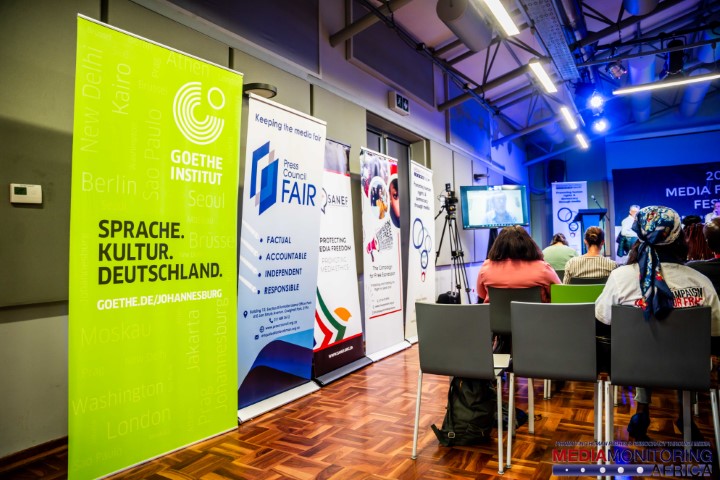
As a personal narrative, for example, for me to be able to do the job that I am doing, I invested a lot of time and of course limited resources of my family and certainly my own to equip myself to do the job that I do, as a journalist in society. Having for example attended three universities, and investing in at least seven years of study. This is significant time invested in one’s education, but others in the media profession, some colleagues have invested more as they have gone beyond master degree level in relevant education, up to doctoral level. Personally I have invested more than 20 years of experience in the profession, not an insignificant experience in a particular profession. But I know as well that others in the profession have invested even more, 30 year, 40 years and some even a lifetime. This is because they are committed in the kind of writing that has the potential to change society for the better.
The question perhaps sis why are journalists investing so much in a professional that some call a thankless job, while others call it a vacation, and which those in the profession know very well that it is unlikely to make you a millionaire?
The reason is simple but very crucial in society. It is a realisation that journalism is an important public good that is produced and practised primarily to make sure that society is better informed, enriched intellectually, culturally and politically so that the public gets closer to making those that rule them accountable for their exercise of power. All those values are important in enriching democracy and in the building of civilisations throughout the world. This is the reason primarilyy why those in the profession went into it in the first place instead of geti9ng better paying jobs such as engineering, finance, science or accounting. Journalism for them is a noble is calling for the few that look at life beyond one’s self-gratification.
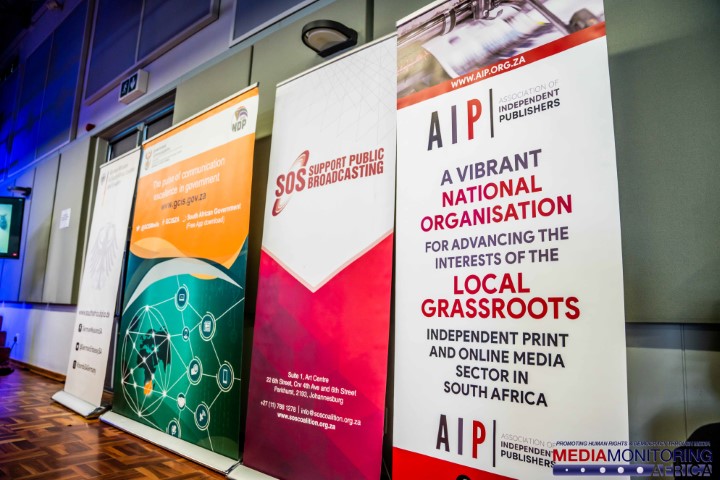
But today with the advent of digital technology that has come with major risks to the noble profession of journalism, such as misinformation and disinformation, and the conglomeration of media ownership and information control, as well as the uneven advertising dominance of Big Tech, such as platforms Google and Facebook, for example, traditional media, which has played an crucial role in human civilisation for centuries is facing a real risk of sustainability. This is because the work that journalist do at times at great risk to their r personal lives end up benefit Big Tech companies at the expense of journalists and the legacy media companies. This is because only a slice of what legacy media used to get, and now the increasing number of independent new media platforms, ends up on these platforms. Instead the big bucks end up with platforms associated with Big Tech companies such as Google, who clearly unfairly benefit from the content created by these smaller media players as the content ends up on their platform, and yet Big Tech does not invest even a cent of that money back to the very same people that make their business model a success as basically Big Tech benefits from the work produced by these hard working journalists working for these media players as they are the original publishers of the content that ends up on Big Tech Media platforms such as Google, Facebook or Linkedin, driving readership or audience to those platforms.
For example even this very same article you are reading, once published on CITYLIFE/ARTS, will end up on those platforms in no time. Even after minutes of being published here as readers will start sharing on those platforms. Ironically even the publishers of this platform will share the very same content on the very Big Tech will share the very same content on the Big Tech platforms in order to reach more readers. This is because they have no alternative but to do that as Big Tech is a monopoly on digital media.
This actually poses a threat to the sustainability of independent publishers who research such content, write it and put it together for audiences and readers, committing their limited resources for the same content to end up benefiting Big Tech, financially. In other words Big Tech is reaping where it has not sown.
These however are not the only risks facing media today. Delegates, mainly from the media who attending this year’s Media Freedom Festival under at Goethe-Institut in Parkwood, Johannesburg will hear more about the challenges facing media today.
“We are excited to announce the 2024 Media Freedom Festival under the theme, “Media for Democracy: Ensuring Access, Accountability, and Integrity in Journalism.. This year marks an exciting expansion of the event, with new and strengthened partnerships with leading organisations committed to amplifying media freedom and human rights. With the South African Broadcasting Corporation (SABC) as our media partner, this year’s festival promises to be more impactful than ever before. The festival honours Black Wednesday (19 October), the day in 1977 when the apartheid government clamped down on media and political organisations with far-reaching detentions, bannings, and newspaper closures. This year’s event promises three days of dynamic dialogue, thought-provoking discussions, and insightful exchanges into the current challenges facing the news media industry. It is co-hosted by the South African National Editors’ Forum (SANEF), Campaign for Free Expression (CFE), Association of Independent Publishers (AIP), Government Communication and Information System (GCIS), the Press Council, SOS Support Public Broadcasting Coalition (SOS), alongside international partners such as the German Embassy and Goethe-Institut,” the organisers said in a statement.
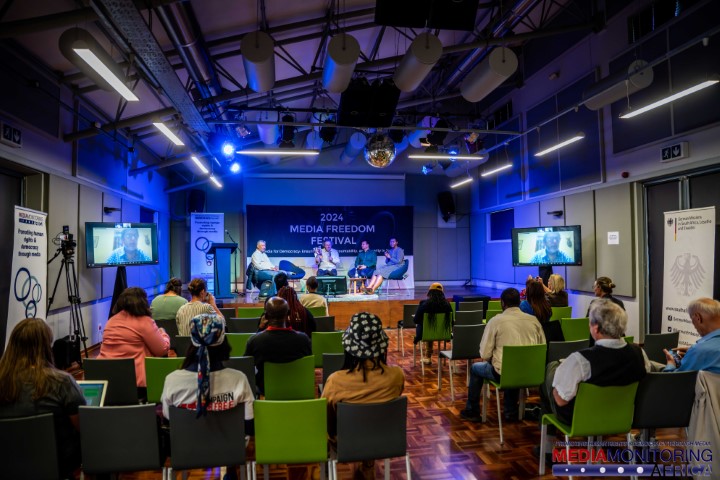
Indeed yesterday’s event, Tuesday October 15, 2024, saw a powerful panel moderated by veteran journalist and founder of Campaign for Free Expression Professor Anton Harber, veteran arts administrator Ismail Mahomed, and veteran journalist and currently a board member of the SABC Pathisani focus their discussion on controversial issues. They .tackled contentious issues facing the media today in South Africa, such as vetting of senior news executives at the SABC by the South African State Security Agency, self censorship in newsrooms today, political interference in news gathering processes, the stifling of artistic creativity and self-expression if the cultural and creative sector through controlling state funding by government agencies such as the National Arts Council and the Department of Sport, Arts and Culture, among others.
This year’s theme is titled the Need For Vigilance: The state of Free expression in South Africa 2024.










